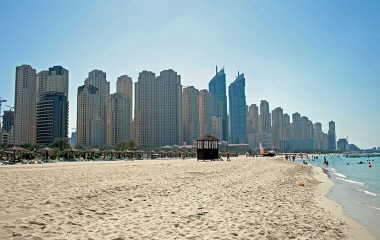Barack Obama has approved a nuclear energy cooperation agreement between the USA and the United Arab Emirates (UAE), saying it will promote defence and security.
 |
Dubai: soon to be nuclear powered? |
In a formal memorandum addressed to secretary of state Hillary Clinton and energy secretary Steven Chu, President Obama said: "I have determined that the performance of the Agreement will promote, and will not constitute an unreasonable risk, to the common defence and security ... I hereby approve the proposed Agreement and authorize the Secretary of State to arrange for its execution."
The agreement in question is the so-called 123 Agreement signed by the USA and the UAE in the closing days of George W Bush's presidency in January 2009. Such agreements are a prerequisite for the transfer of nuclear energy-related materials and components between the USA and another country under Section 123 of the 1954 US Atomic Energy Act, establishing the legal framework for civil nuclear cooperation under non-proliferation conditions and controls.
Under special terms in the 123 Agreement, the UAE has renounced plans to enrich and reprocess uranium or other fuel, instead pledging to obtain nuclear fuel from reliable international suppliers. The USA will have the right to cancel the agreement if the UAE reneges on its commitment not to engage in enrichment or reprocessing activities.
Recent reports of alleged human rights abuses in the UAE have made for a difficult political climate surrounding the agreement, but the presidential approval now clears the way for it to be formally submitted to the US Congress. It will pass into law after it has been before Congress for 90 days of continuous session unless lawmakers pass legislation against it.
The UAE's Ministry of Foreign Affairs welcomed Obama's endorsement of the agreement. Ambassador Hamad Al Kaabi, the UAE's permanent representative to the IAEA, also praised Obama's actions. According to UAE state news agency WAM, he said the country was "establishing an innovative model which should help to reduce global non-proliferation concerns by demonstrating that nuclear energy can be adopted in a manner that is highly transparent, safe, secure, and peaceful by design".
According to the UAE government's July 2008 nuclear policy, the country's energy demand is likely to double by 2020. Natural gas supplies are only likely to be able to meet half of the projected growth, and nuclear is seen as a proven, competitive option to meet the demand while providing future energy security. The UAE is therefore actively working towards introducing nuclear power with plans for three reactors to be online by 2020. It is cooperating closely with the International Atomic Energy Agency (IAEA) to reach its goal, recently signing the Additional Protocol of the Nuclear non-Proliferation Treaty (NPT) granting the IAEA greater freedom to carry out inspections of its nuclear facilities – even though as yet it does not have any nuclear power or fuel cycle facilities to inspect.
Nine companies have been invited to express their interest in the construction of the UAE's first nuclear power plant, with the possibility of a contract being signed late in 2009. Areva's EPR, Westinghouse's AP1000 and GE-Hitachi's ABWR technology are all thought to be under consideration, although the country has expressed an intention to standardize to one technology.
The UAE has already signed Memoranda of Understanding (MoU) on nuclear energy cooperation with the UK and Japan, and has a nuclear cooperation agreement with France.






_15863.jpg)







